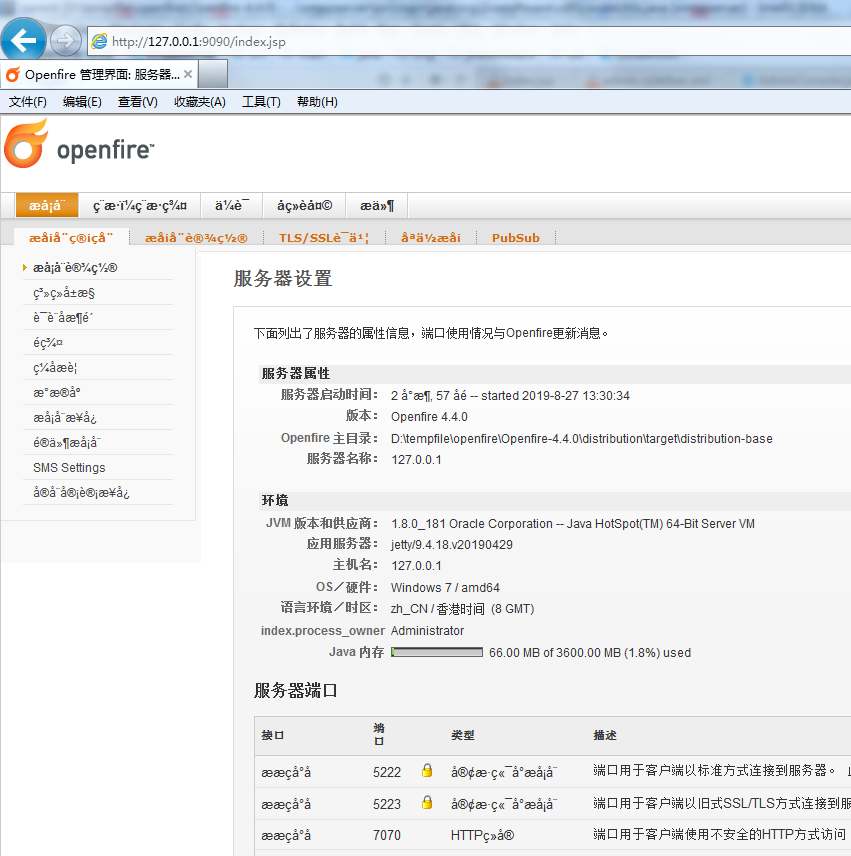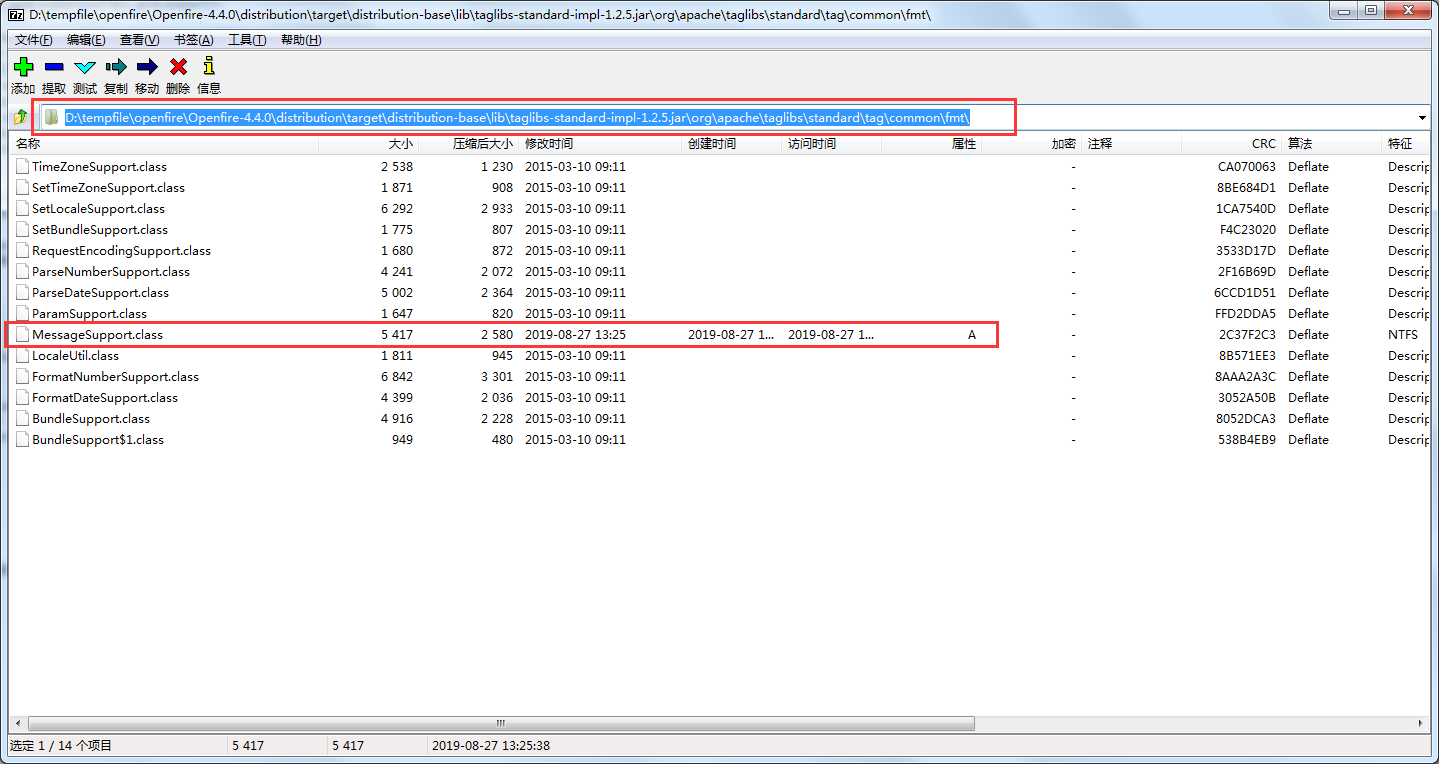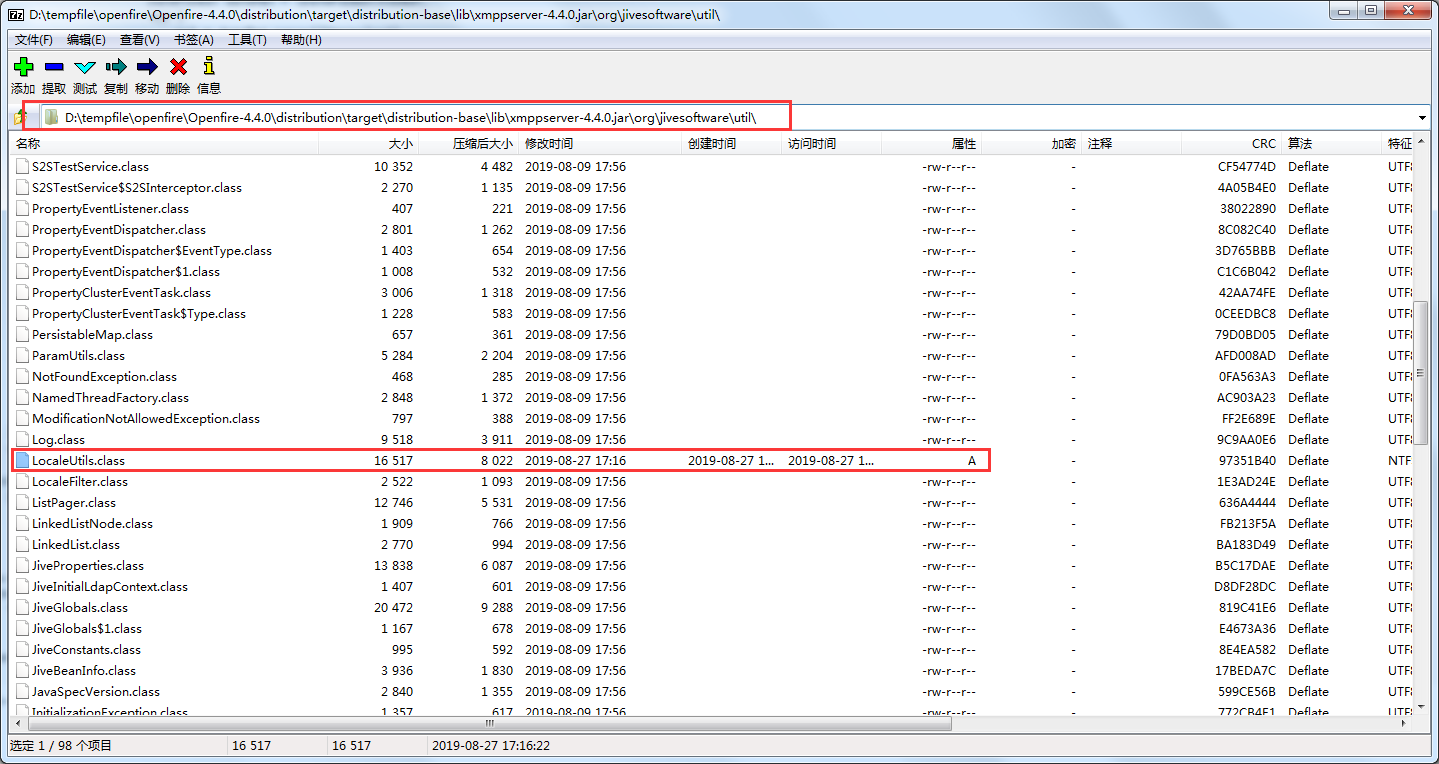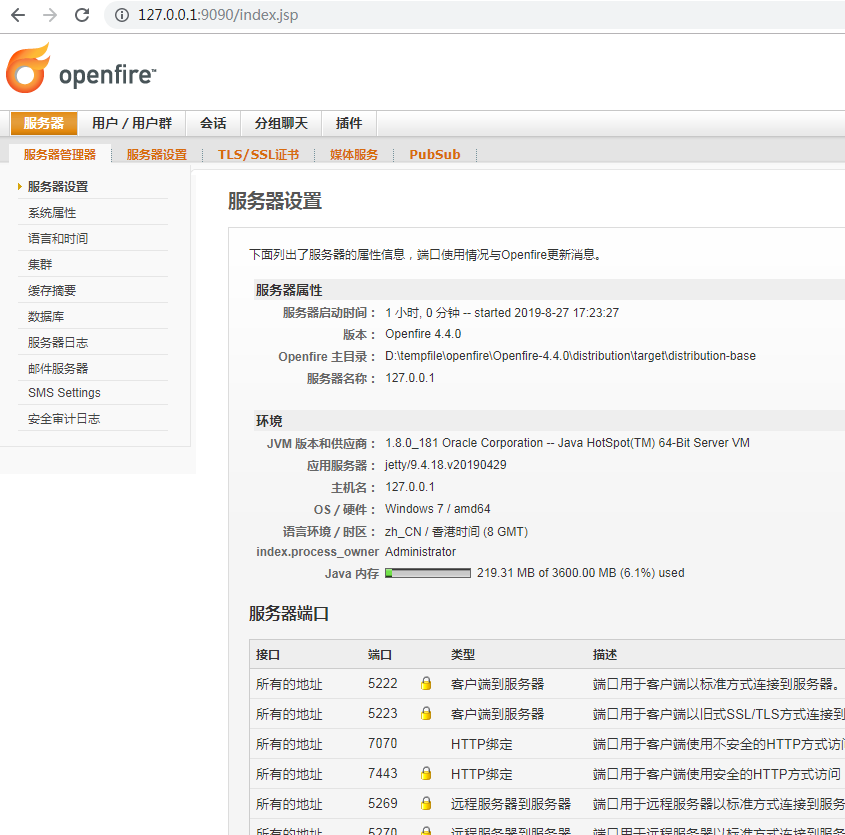openfire控制台乱码问题
2019-08-27openfire攻城狮5617°c
A+ A-最近在折腾openfire,源码在IDEA里面跑起来后,发现IDEA控制台输出中文是乱码,而且访问管理端地址,语言不管选中文还是英文,菜单部分依然还是有乱码存在,找了好久,总算是解决了问题,通过百度查到的,千篇一律的都说啥国际化文件里面少了部分属性,所以导致乱码,我也跟着尝试了,并没有什么用,最后还是自己调试源码解决了问题。
openfire版本:4.4.0
选择的语言是中文。
下面是乱码的控制台界面。(其实已经修复了中间部分的乱码了,中间部分已经是正常显示了)

其实这种乱码,主要有两个地方,首先第一个地方是JSTL的jar包,jar包的名字是 taglibs-standard-impl-1.2.5.jar 出问题的类是org.apache.taglibs.standard.tag.common.fmt.MessageSupport.java
这个类主要影响的是所有写了<fmt:message key="index.title.info"/> 标签的JSP页面,上面我标记出来的类就是负责将该标签中的"index.title.info"通过i18n国际化文件转换为对应语言的字符串。
在转换的过程中我不知道为啥它取到的是乱码,但是我在它下面添加了几行代码,重新给字符串编码,就解决了这个问题。
主要该的是这个类中的doEndTag()方法中的几行代码,整个类我就不贴出来了,这个方法的代码如下:
@Override
public int doEndTag() throws JspException {
String key = null;
LocalizationContext locCtxt = null;
// determine the message key by...
if (keySpecified) {
// ... reading 'key' attribute
key = keyAttrValue;
} else {
// ... retrieving and trimming our body
if (bodyContent != null && bodyContent.getString() != null) {
key = bodyContent.getString().trim();
}
}
if ((key == null) || key.equals("")) {
try {
pageContext.getOut().print("??????");
} catch (IOException ioe) {
throw new JspTagException(ioe.toString(), ioe);
}
return EVAL_PAGE;
}
String prefix = null;
if (!bundleSpecified) {
Tag t = findAncestorWithClass(this, BundleSupport.class);
if (t != null) {
// use resource bundle from parent <bundle> tag
BundleSupport parent = (BundleSupport) t;
locCtxt = parent.getLocalizationContext();
prefix = parent.getPrefix();
} else {
locCtxt = BundleSupport.getLocalizationContext(pageContext);
}
} else {
// localization context taken from 'bundle' attribute
locCtxt = bundleAttrValue;
if (locCtxt.getLocale() != null) {
SetLocaleSupport.setResponseLocale(pageContext,
locCtxt.getLocale());
}
}
//注意这里,这里就是我改过的地方---start
//String message = UNDEFINED_KEY + key + UNDEFINED_KEY;
String message = key;
if (locCtxt != null) {
ResourceBundle bundle = locCtxt.getResourceBundle();
if (bundle != null) {
try {
// prepend 'prefix' attribute from parent bundle
if (prefix != null) {
key = prefix + key;
}
//message = bundle.getString(key);
try{
message = new String(bundle.getString(key).getBytes("ISO-8859-1"), "UTF-8");
}catch (Exception e){
}finally {
try{
message = new String(bundle.getString(key).getBytes("ISO-8859-1"), "UTF-8");
}catch (Exception e){
}
}
//这里是结束地方 ----end
// Perform parametric replacement if required
if (!params.isEmpty()) {
Object[] messageArgs = params.toArray();
MessageFormat formatter = new MessageFormat(""); // empty pattern, default Locale
if (locCtxt.getLocale() != null) {
formatter.setLocale(locCtxt.getLocale());
} else {
// For consistency with the <fmt:formatXXX> actions,
// we try to get a locale that matches the user's preferences
// as well as the locales supported by 'date' and 'number'.
//System.out.println("LOCALE-LESS LOCCTXT: GETTING FORMATTING LOCALE");
Locale locale = SetLocaleSupport.getFormattingLocale(pageContext);
//System.out.println("LOCALE: " + locale);
if (locale != null) {
formatter.setLocale(locale);
}
}
formatter.applyPattern(message);
message = formatter.format(messageArgs);
}
} catch (MissingResourceException mre) {
message = UNDEFINED_KEY + key + UNDEFINED_KEY;
}
}
}
if (var != null) {
pageContext.setAttribute(var, message, scope);
} else {
try {
pageContext.getOut().print(message);
} catch (IOException ioe) {
throw new JspTagException(ioe.toString(), ioe);
}
}
return EVAL_PAGE;
}因为这个是该的是jar包的源码,因此在编译后要覆盖Openfire-4.4.0\distribution\target\distribution-base\lib 这个路径下的taglibs-standard-impl-1.2.5.jar这个包中的类,下图是我的路径,根据自己项目的路径参考一下

替换完成后,至少登录页面已经是中文了。
但是登陆成功后还是看到了文章一开始的那个截图页面,菜单啥的都还是乱码,所以我又继续深入跟踪了一下,发现openfire的管理端用的是dwr技术,因此花了好些事件又找到
D:\tempfile\openfire\Openfire-4.4.0\xmppserver\src\main\java\org\jivesoftware\util\LocaleUtils.java
这个类,跟上面的方法一样,也是在
String getLocalizedString(String key, Locale locale, List arguments, ResourceBundle bundle)
这个方法中,更改字符串编码:
public static String getLocalizedString(String key, Locale locale, List arguments,
ResourceBundle bundle)
{
if (key == null) {
throw new NullPointerException("Key cannot be null");
}
if (locale == null) {
locale = JiveGlobals.getLocale();
}
String value = getDefaultLocalizedString(key);
// See if the bundle has a value
try {
// The jdk caches resource bundles on it's own, so we won't bother.
//value = bundle.getString(key);
//这里更改字符串编码
try{
String value1 = new String(bundle.getString(key).getBytes("ISO-8859-1"), "UTF-8");
value = new String(bundle.getString(key).getBytes("ISO-8859-1"), "UTF-8");
}catch (Exception e){
}finally {
try{
value = new String(bundle.getString(key).getBytes("ISO-8859-1"), "UTF-8");
}catch (Exception e){
}
}
//修改结束
// perform argument substitutions
if (arguments != null) {
MessageFormat messageFormat = new MessageFormat("");
messageFormat.setLocale(bundle.getLocale());
messageFormat.applyPattern(value);
try {
// This isn't fool-proof, but it's better than nothing
// The idea is to try and convert strings into the
// types of objects that the formatters expects
// i.e. Numbers and Dates
Format[] formats = messageFormat.getFormats();
for (int i = 0; i < formats.length; i++) {
Format format = formats[i];
if (format != null) {
if (format instanceof DateFormat) {
if (arguments.size() > i) {
Object val = arguments.get(i);
if (val instanceof String) {
DateFormat dateFmt = (DateFormat)format;
try {
val = dateFmt.parse((String)val);
arguments.set(i, val);
}
catch (ParseException e) {
Log.error(e.getMessage(), e);
}
}
}
}
else if (format instanceof NumberFormat) {
if (arguments.size() > i) {
Object val = arguments.get(i);
if (val instanceof String) {
NumberFormat nbrFmt = (NumberFormat)format;
try {
val = nbrFmt.parse((String)val);
arguments.set(i, val);
}
catch (ParseException e) {
Log.error(e.getMessage(), e);
}
}
}
}
}
}
value = messageFormat.format(arguments.toArray());
}
catch (IllegalArgumentException e) {
Log.error("Unable to format resource string for key: "
+ key + ", argument type not supported");
}
}
}
catch (java.util.MissingResourceException mre) {
Log.warn("Missing resource for key: " + key
+ " in locale " + locale.toString());
}
return value;
}改完之后重新编译一下,不好使的话,将class文件覆盖到xmppserver-4.4.0.jar 这个jar包中对应的路径:

重启服务器,可以看到已经解决了乱码问题:

